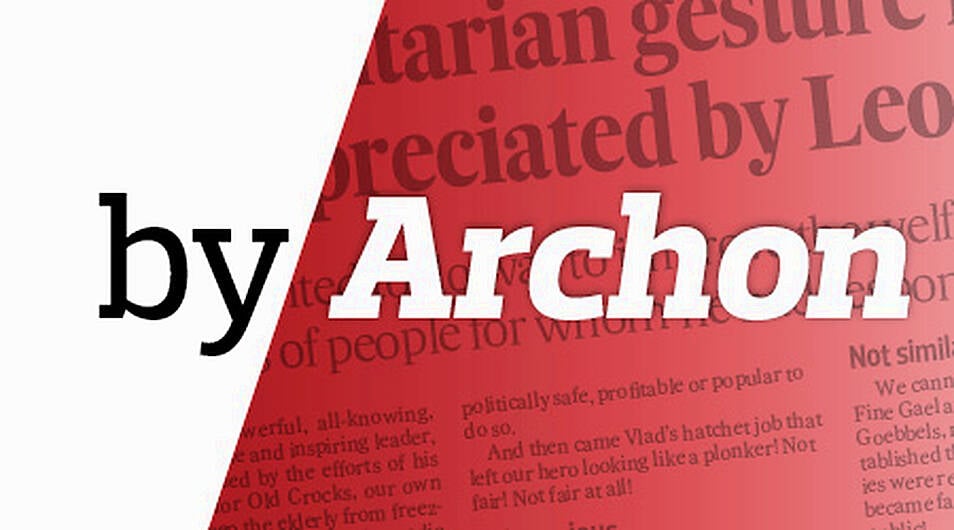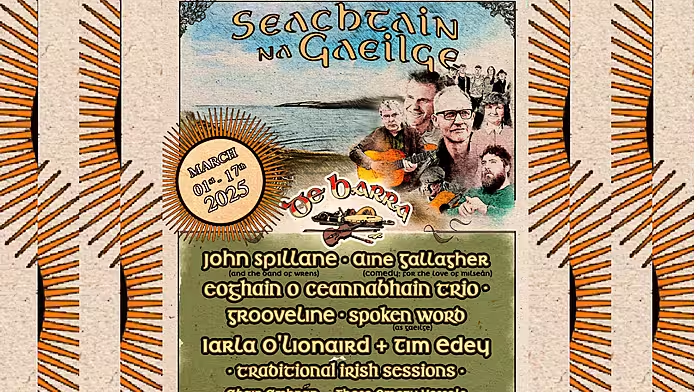A kind of ‘adolescent rebellion' is what happens when religion is reduced to a political or ethnic sentiment
COURTESY of Niall O’Dowd’s publication, ‘Irish Central,’ we’ve learned of a media-savvy US cleric who was not thrilled at all by Our Vlad’s visit to ‘Oirish’ America for the St Patrick’s Day festivities.
The chap in question is a New York priest, Fr George Rutler, pastor of St Michael the Archangel Church on West 34th Street, Manhattan, who has an international reputation for his weekly television programmes on EWTN, the largest religious media network in the world with an audience of a quarter of a billion people in 140 countries and an annual revenue of sixty million dollars.
Fr Rutler has many followers in this country who noted with interest his comments about the Dear Leader, the Taoiseach who, he said, was ‘publicly living in perverse contempt for the sacrament of Holy Matrimony.’ It was a powerfully nostalgic criticism, reminiscent of a bygone time when God was in his heaven and all was right with the world.
And then we paused: ‘Perverse’? Was that too harsh, considering that as a Late Middle English word it can mean ‘unreasonable,’ ‘contrary to the accepted standards of practice,’ ‘deliberately deviating from what is normal,’ wayward, cantankerous and persistently holding to what is wrong.
Surely this good man of the cloth wasn’t stating that Our Vlad was the sort of person who would go beyond the bounds of the Lord’s moral code? Never!
Dancing Druids
Yet, it was clear that Fr Rutler had the interests of Catholic Ireland among his deepest feelings. And didn’t he inform his parishioners in the parish bulletin on St Patrick’s Day that, although our patron saint banished the ‘Druids’ (we thought it was snakes), they had returned in a modern form and ‘defiantly danced in the streets of Dublin when abortion was legalised’?
And, when ‘Irish Central’ asked if the decades-long paedophile priests scandal was the reason for the fall-off in worshippers in Ireland, he blamed very weak Church leadership and ‘a type of cultural Catholicism that was susceptible to passing trends’ – a scholarly explanation that had us scratching our head in wonder as we tried to reconcile the savage, barbaric and hellish treatment of children with ‘cultural Catholicism’ and ‘passing trends.’
Very profound, indeed!
To the suggestion that Ireland was now the most anti-Catholic country on planet earth, he preferred the concept that the country was undergoing a kind of ‘adolescent rebellion’ and he warned that this is what happens when religion is reduced to a political or ethnic sentiment.’
Indeed, he put forward for consideration the possibility that something similar happens in New York on St Patrick’s Day when religion morphs into a parade and becomes a drunken charade of St Patrick and his green-beer-imbibing leprechauns!
Warning to nations!
And did Ireland deserve what it got? Kinda! According to Fr Rutler, whereas ‘heroic Irish missionaries’ converted much of Nigeria, which now has 53 million baptised Catholics, the Irish failed to ‘heed the warnings of St John Paul II when he set foot on the soil of Éire in 1979.’
Since then, the country has been racked by ecclesiastical misconduct, its historic seminary of Maynooth suffers the lowest number of students since the eighteenth century, and a former rector abandoned the place to become leader of a bizarre cult in Arizona.
Even more disturbing was the fact that fewer than 130,000 people attended a mass in Phoenix Park that was said by the current Pope whereas in 1979 more than a million and a half turned out for John Paul.
The message of it all? What happened in Ireland was a warning to Catholics in the United States that something similar could happen there. However he took hope from the fact that young Americans, including ‘successful young professionals’ were coming to mass in his church and, as well, an increasing immigrant congregation was keeping the faith strong.
And that seemed to be as far as Fr Rutler’s interest or concern for ‘Catholic Ireland’ extended. A wise man and a sensible approach, indeed.
Nonetheless, it was a pity that the internationally popular clerical communicator took a side-swipe at Our Vlad instead of utilising his television company’s immense resources to brief himself on the significance of the disintegration of the Irish Catholic Church and the fall-away of congregations. Media-guff, such as ‘adolescent rebellion’ doesn’t cut much ice in this neck of the woods!
Moral dishonesty
For instance, why is the Irish Catholic Church completely bereft of political influence? Is that a good thing or a bad thing? Why does the Church’s moral authority in Ireland remain at ground level and why does it continue to have a zilch role in society?
Why is it unable to cope with the secularist agenda outrageously being implemented by Vlad and his merry Fine Gael men and women? And do these fundamental conundrums impact in any way on America and its green-beer-leprechauns?
Was it the deliberate unhurriedness of the Bishops and their failure to take decisive action at the paedophilic horrors committed by individual priests and brothers, and collectively in some institutions run by some religious orders, that led to the collapse?
Yes, we accept that the monstrous crimes were committed by a small number of priests but it was the Church’s moral dishonesty, the cover-up, the lies, the elaborate misrepresentation, the absence of accountability and the hypocrisy that shocked people and did the damage.
Is America different?
And, while the Irish Catholic Church can no longer boast of possessing outstanding moral authority or credibility – a situation aggravated by its complete inability to cope with the encroachment of secularism and materialism into people’s lives – is American Catholicism really that different and is it next in line for the type of spiritual crisis that now affects Ireland?
Is the size of Catholic America, its wealth and self-righteousness, enough to prevent corruption taking root and engendering a spiritual disaster of huge dimensions?
Jean Blanchard’s ‘The Church in Contemporary Ireland,’ which was written in the early 1960s, unintentionally casts a macabre light on the Irish Church as it is now, its fallibility as an institution and the peril of accepting as fact the idea that the authority of the bishops, always will sustain the Church.
On page 19, Blanchard observes that ‘The Bishops of Ireland appear to have more power, in practice, than those of any other country in the world … their authority is great over the faithful … the social importance of the head of the diocese is unrivalled. The Irish episcopacy is truly in a flourishing condition.’
It is a wistful reminder that nothing lasts forever or, as the man said (appropriately in Latin): ‘sic transit gloria mundi.’










